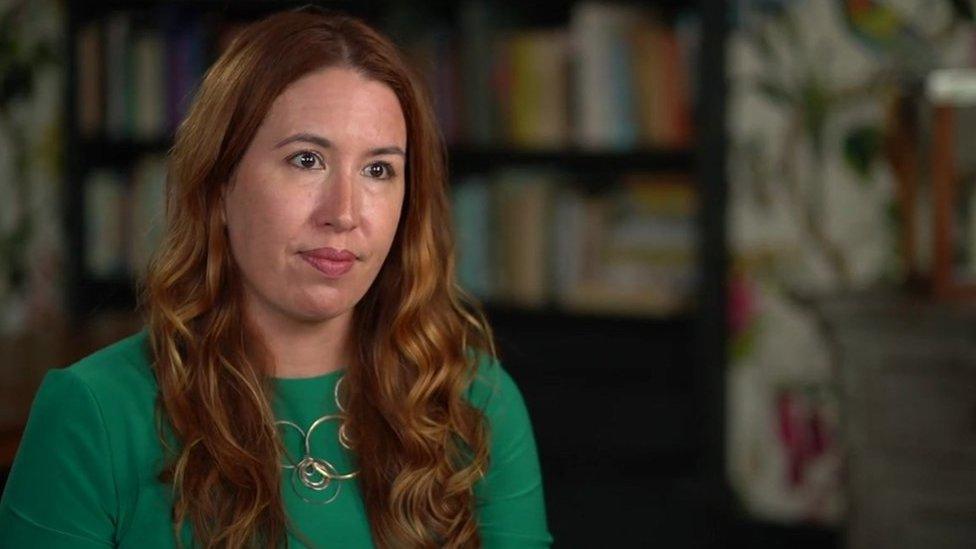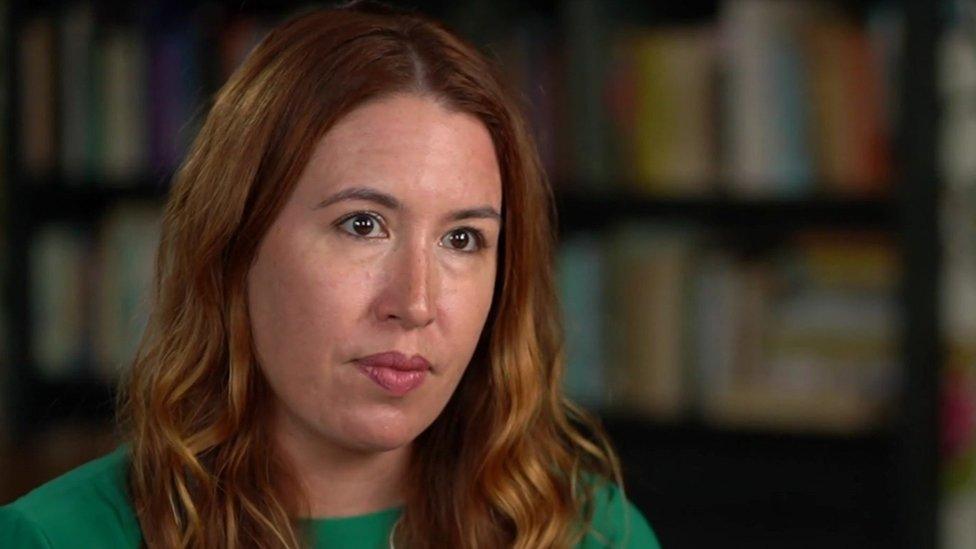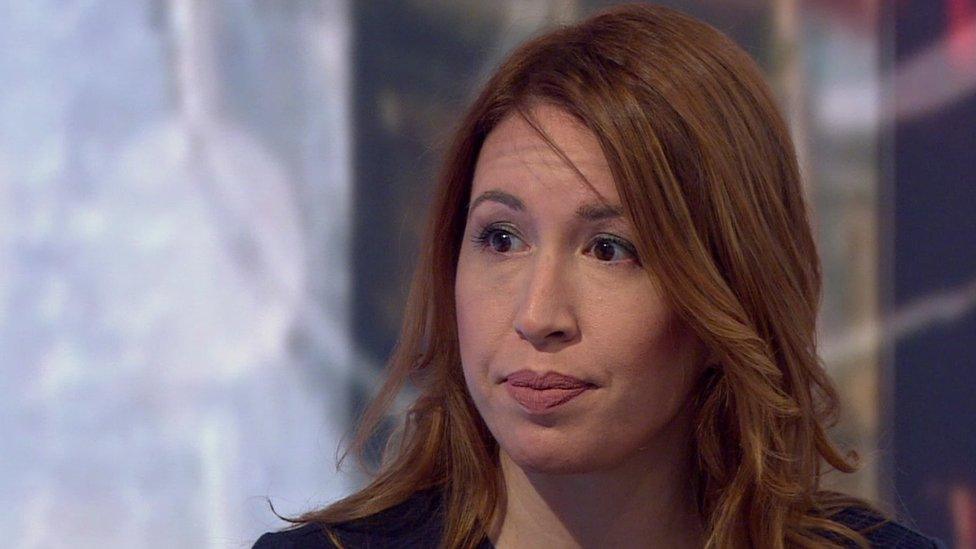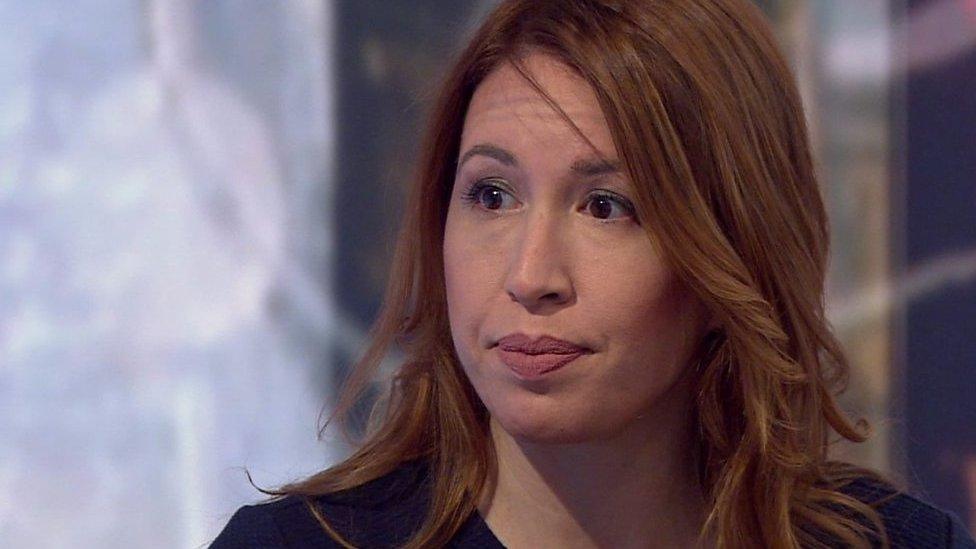'I no longer feel safe': Rape adviser quits role and UK
- Published

Emily Hunt says she no longer feels safe in the UK
The government's rape adviser has said her experiences in the justice system as an abuse victim left her feeling unsafe and needing to quit the UK.
Emily Hunt told the BBC she was moving to the US because "it is time for me to feel OK again".
She said she was proud of the successes of an official review into rape prosecutions but there was a "lack of will" to push on with more change.
The government praised her "valuable work" and contribution to the review.
For two years, Ms Hunt has been the Ministry of Justice's independent adviser to its rape review.
Launched in March 2019, its purpose was to look at victims' experiences - from their reports to police through to outcomes in court.
It delivered on promises, external to return the volume of cases going to trial to 2016 levels and reduce the number of victims withdrawing from the process.
Ms Hunt, a dual American-British citizen born in the US, however, said that she had seen the momentum "slow and stop" and that her own drawn-out ordeal had convinced her she had to leave.
In May 2015 Ms Hunt was filmed naked while unconscious in a London hotel room. She had no recollection of how she got there and said she was drugged and raped.
Christopher Killick was initially arrested on suspicion of rape, but the case was dropped due to a lack of evidence. He has always denied rape.
Five years later he pleaded guilty to voyeurism and was given a 30-month community order and told to never contact Ms Hunt.
Earlier this year, Killick was arrested after repeatedly breaking the restraining order through messages he left on Twitter.
He was remanded in custody for three months and later handed a suspended 14-month prison sentence.
Ms Hunt, who was appointed an OBE during her campaign for justice, said the reopening of the case had contributed to her decision to quit her role and leave the country.
"The first time this idea came to me was sitting in the victims' room, again, asking 'how can I be here?' Since the sentencing I have not felt safe," she said.
"It is time for me to feel OK again. There is a better way to live."
"It is one thing to give a little piece of your soul to see change and another to repeat yourself and not have anything happen.
"I still feel I am in danger of being stalked," she said, adding: "How do I live in a country where I feel I cannot report a crime" without facing the same ordeal.
In an interview with Channel 4 News she also said there was no "purpose" to her staying on in her role. She told the BBC that progress made in the review was at risk of being lost.
'Foot has come off the pedal'
Ms Hunt became an independent adviser to the government's rape review in 2021 following her fight for justice.
She helped implement a 24-hour sexual abuse helpline, and has championed Operation Soteria Bluestone, which has exposed criminal justice system failures and pushes a suspect-focused approach to catching rapists.
She told the BBC that from the outset of the review "there was real momentum to change, not just policy but culture", to put victims' needs at the heart of investigations and fight against what she described as "rape myth" - the questioning of a victim's motivations or innocence.
"It was amazing to be part of that, to have seen success because that proves there can be change," she said.
But she said in the last 18 months "the foot has come off the pedal and I can see the next fall coming".
She said rape investigation and prosecution was "not being prioritised as it should".
"I have watched the momentum slow and stop," she said, adding there was a sense that for all the changes in how victims were treated, people were thinking "we don't have to do this anymore".
Ms Hunt said that a fundamental change in the justice system, to put victims at the heart of it, was needed for her to reconsider her decision.
"We are not helping victims' interests within the justice system," she said.
"For instance, there is no [statutory] compassionate leave for victims of crime. Jurors get more help with getting to court than victims."
"You don't have a criminal justice system without victims willing to come forward," she said.
Ms Hunt expressed unease about her move to America. "I was born in the US but have spent most of my life in the UK. I have never lived in America as an adult," she said.
"I don't know how to be an American. My daughter has lived here all of her life and I never imagined I would leave this country.
"But for me this is how it is. I do not feel safe."
A Ministry of Justice spokesperson said: "We thank Emily Hunt for her valuable work over the last two years, supporting the government in exceeding all three ambitions of our rape review ahead of schedule.
"We remain determined to stamp out these appalling crimes, making sure the criminal justice system supports victims and holds perpetrators to account."
Chief Constable Sarah Crew, the National Police Chiefs' Council lead for rape and adult sexual offences said she wanted to thank Ms Hunt for her work.
"She has been a critical friend, scrutineer and advocate for the work policing are doing to make change. We are working hard in policing to improve our response to rape and sexual offences. Everything we are doing is about being better for victims."
Related topics
- Published4 September 2020

- Published6 November 2017

- Published6 November 2017
